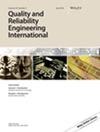Web service reliability and scalability determination using optimized depth wise separable convolutional neural network
IF 2.8
3区 工程技术
Q3 ENGINEERING, INDUSTRIAL
引用次数: 0
Abstract
Web service composition (WSC), a distributed architecture, creates new services atop existing ones. Ensuring trust and assessing performance and dependability in online services coordination is essential. In this paper, “Web Service Reliability and Scalability Determination Using Depth Wise Separable Convolutional Neural Network” (WSRS‐DWSCNN) is proposed to assess the trustworthiness of online service compositions, particularly focusing on performance and dependability. This work addresses the need to predict the reliability and scalability of Business Process Execution Language (BPEL) composite web services. The proposed approach transforms the BPEL specification into a Depth Wise Separable Convolutional Neural Network (DWSCNN) and annotates it with probabilistic properties for prediction. The DWSCNN model classifies the outcomes as correct or incorrect, and to enhances the prediction of web service composition scalability and reliability, we optimize the DWSCNN's weight parameters using the Adolescent Identity Search Algorithm (AISA). The proposed technique is activated in Python and its efficacy is analyzed under some metrics, such as reliability, scalability, accuracy, sensitivity, specificity, precision, F‐measure. The proposed method provides 12.36%, 45.39%, and 25.97% better reliability, 41.39%, 11.39%, 34.16% better accuracy compared with existing methods like, Web service reliability prediction depending on machine learning (WSRS‐K‐means), reliability prediction method for multiple state cloud/edge‐basis network utilizing deep neural network (WSRS‐DNN‐BO), and improving reliability of mobile social cloud computing utilizing machine learning in content addressable network (WSRS‐CAN), respectively.利用优化的深度可分离卷积神经网络确定网络服务的可靠性和可扩展性
网络服务组合(WSC)是一种分布式架构,它在现有服务的基础上创建新的服务。在在线服务协调中,确保信任、评估性能和可靠性至关重要。本文提出了 "利用深度可分离卷积神经网络确定网络服务可靠性和可扩展性"(WSRS-DWSCNN),以评估在线服务组合的可信度,特别是性能和可靠性。这项工作满足了预测业务流程执行语言(BPEL)复合网络服务的可靠性和可扩展性的需求。所提出的方法将 BPEL 规范转化为深度可分离卷积神经网络(DWSCNN),并为其标注用于预测的概率属性。DWSCNN 模型将结果分类为正确或不正确,为了提高网络服务组合的可扩展性和可靠性,我们使用青少年身份搜索算法(AISA)优化了 DWSCNN 的权重参数。我们在 Python 中激活了所提出的技术,并根据可靠性、可扩展性、准确性、灵敏度、特异性、精确度、F-度量等指标对其功效进行了分析。与基于机器学习的网络服务可靠性预测(WSRS-K-means)、利用深度神经网络的多状态云/边缘基础网络可靠性预测方法(WSRS-DNN-BO)和在内容可寻址网络中利用机器学习提高移动社交云计算可靠性(WSRS-CAN)等现有方法相比,所提方法的可靠性分别提高了12.36%、45.39%和25.97%,准确性分别提高了41.39%、11.39%和34.16%。
本文章由计算机程序翻译,如有差异,请以英文原文为准。
求助全文
约1分钟内获得全文
求助全文
来源期刊
CiteScore
4.90
自引率
21.70%
发文量
181
审稿时长
6 months
期刊介绍:
Quality and Reliability Engineering International is a journal devoted to practical engineering aspects of quality and reliability. A refereed technical journal published eight times per year, it covers the development and practical application of existing theoretical methods, research and industrial practices. Articles in the journal will be concerned with case studies, tutorial-type reviews and also with applications of new or well-known theory to the solution of actual quality and reliability problems in engineering.
Papers describing the use of mathematical and statistical tools to solve real life industrial problems are encouraged, provided that the emphasis is placed on practical applications and demonstrated case studies.
The scope of the journal is intended to include components, physics of failure, equipment and systems from the fields of electronic, electrical, mechanical and systems engineering. The areas of communications, aerospace, automotive, railways, shipboard equipment, control engineering and consumer products are all covered by the journal.
Quality and reliability of hardware as well as software are covered. Papers on software engineering and its impact on product quality and reliability are encouraged. The journal will also cover the management of quality and reliability in the engineering industry.
Special issues on a variety of key topics are published every year and contribute to the enhancement of Quality and Reliability Engineering International as a major reference in its field.

 求助内容:
求助内容: 应助结果提醒方式:
应助结果提醒方式:


